In our highly connected world, your router is much more than just a box with blinking lights — it’s the heart of your digital life. Whether you’re enjoying 4K streaming, engaging in competitive gaming, working remotely, or controlling a smart home, the right router can significantly influence your online experience. With countless options available — from mesh systems to gaming routers and smart devices — choosing the right one can feel like a challenge.
That’s why we’ve done the hard work for you. In this guide, we’ll outline the best routers by type, so you can easily find one that meets your specific requirements. We’ll cover everything from high-speed performance and dependable connectivity to advanced security features and straightforward setup, highlighting the top choices.

The first router was...?
The Interface Message Processor (IMP), created in 1969 as part of the ARPANET project, was the first device resembling a modern router. Here’s a closer look:
- Context: ARPANET, funded by the U.S. Department of Defense, was one of the first operational packet-switching networks and a precursor to the internet. It needed a way to connect disparate computer systems across long distances.
- What It Was: The IMP was a specialized computer built by Bolt, Beranek, and Newman (BBN) to handle packet routing. It acted as a gateway between host computers, managing the flow of data packets across the network.
- First Deployment: On October 29, 1969, the first successful message was sent over ARPANET from UCLA to Stanford Research Institute (SRI). This historic transmission—“LO” (meant to be “LOGIN” before the system crashed)—relied on two IMPs, one at each site, to route the data.
- Specs: The IMP was based on a Honeywell DDP-516 minicomputer, ruggedized for reliability, with 12 KB of core memory (later upgraded to 24 KB). It had no disk storage and was programmed to handle packet switching using a custom protocol, the precursor to modern TCP/IP.
The IMP pioneered packet-switching, a core function of modern routers, by breaking data into packets for efficient routing and reassembly at their destination. It connected different host computers, establishing the foundation for the internet. Additionally, the IMP used dynamic routing tables to find optimal paths for packets, adapting to network conditions like today’s routers do.
The first IMP (IMP #1) is now a historical artifact, preserved at UCLA’s Kleinrock Internet History Center. It’s often called the “first router” by internet pioneers like Leonard Kleinrock, who oversaw the first ARPANET transmission.
Why do we need routers?
Routers are essential devices for connecting and managing networks. Here’s why we need them:
- Internet Access: Routers enable multiple devices to connect to a single internet source, creating a local network for homes or businesses.
- Efficient Data Transfer: They direct data packets efficiently between devices and networks, ensuring fast and reliable communication.
- Network Security: Routers often include firewalls and encryption to protect our network from cyber threats.
- Device Management: Modern routers allow prioritization of bandwidth, ensuring critical tasks (like video calls or gaming) get optimal performance.
- Seamless Connectivity: Advanced routers, such as mesh systems, eliminate dead zones and provide consistent Wi-Fi coverage across larger spaces.
- Smart Home Integration: Many routers now support IoT (Internet of Things) devices, making it easier to manage smart home setups.
At their core, routers solve the problem of connectivity in a world where everything is online. They’re not just about getting on the internet—they’re about doing it efficiently, securely, and reliably across all our devices. Without a router, you’d be stuck with a single wired connection, no local networking, and no way to manage the demands of modern tech.
What are the different types of routers?
Routers vary widely to meet diverse needs, from Standalone units offering advanced Wi-Fi 7 speeds and multi-gigabit ports for smaller homes, to Mesh systems that eliminate dead zones in large spaces. Gaming routers prioritize low latency for optimal performance, while Smart Home Hub routers integrate IoT device management. Enterprise-Grade routers provide robust security and scalability for businesses, whereas Budget routers offer basic connectivity at affordable prices. Additionally, Travel routers deliver secure, portable Wi-Fi for users on the go, catering to the increasing mobility of modern lifestyles.
| Type | Strengths | Target Audience |
|---|---|---|
| Standalone | Speed & Future-Proofing | Small/Medium Homes |
| Mesh Systems | Coverage | Large Homes |
| Gaming Routers | Low Latency | Gamers |
| Smart Hub Routers | IoT Integration | Smart Homes |
| Enterprise-Grade | Scalability & Security | Businesses/Pro Users |
| Budget Routers | Affordability | Small Spaces/Budgets |
| Travel Routers | Portability & Security | Travelers |
- Type: Standalone
- Strengths: Speed & Future-Proofing
- Target Audience: Small/Medium Homes
- Type: Mesh Systems
- Strengths: Coverage
- Target Audience: Large Homes
- Type: Gaming Routers
- Strengths: Low Latency
- Target Audience: Gamers
- Type: Smart Hub Routers
- Strengths: IoT Integration
- Target Audience: Smart Homes
- Type: Enterprise-Grade
- Strengths: Scalability & Security
- Target Audience: Professionals in precision-demanding fields
- Type: Budget Routers
- Strengths: Affordability
- Target Audience: Small Spaces/Budgets
- Type: Travel Routers
- Strengths: Portability & Security
- Target Audience: Travelers
Best Standalone Routers (Wi-Fi 6, 6E, and 7)
TP-Link AX6000 Wi-Fi 6 Router
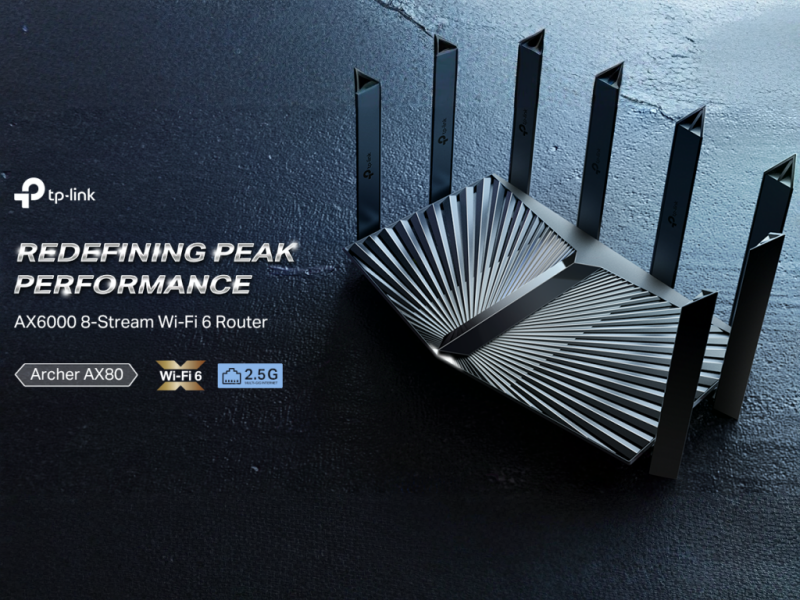
The AX6000 Router is a powerful Wi-Fi 6 router designed for high-speed, multi-device connectivity. It features dual-band Wi-Fi with speeds up to 6000 Mbps, extended coverage through beamforming antennas, and a 2.5 Gbps port for multi-gig wired connections. Technologies like MU-MIMO and OFDMA enhance network efficiency for numerous devices, while built-in VPN client support and TP-Link HomeShield provide robust security. It also supports OneMesh for seamless whole-home Wi-Fi expansion and Amazon Alexa voice control, ensuring compatibility with a wide range of internet service providers.
NETGEAR Nighthawk Wi-Fi 6E Router
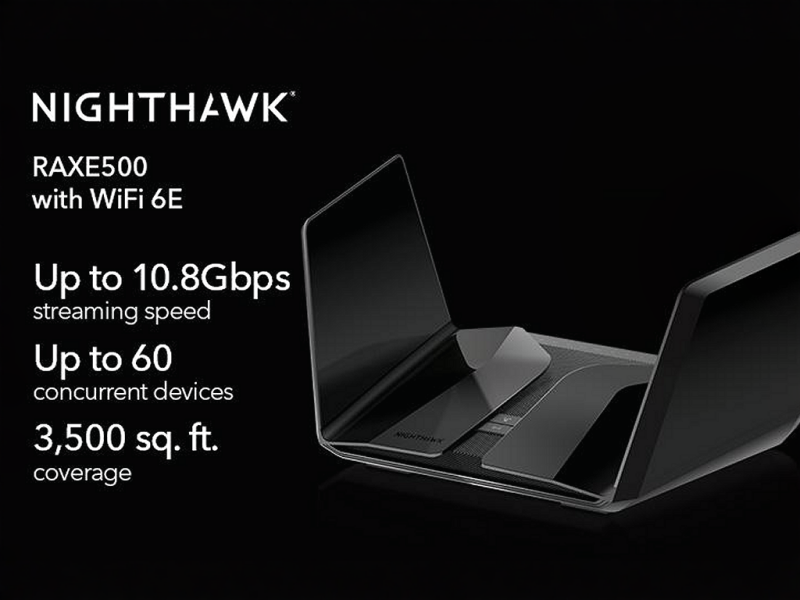
The Nighthawk RAXE500 Router is a high-performance Wi-Fi 6E router offering tri-band speeds up to 10.8 Gbps, with a dedicated 6 GHz band for Wi-Fi 6E devices. It supports up to 60 devices across 3,500 sq ft, powered by a 1.8 GHz quad-core processor. Security is prioritized with NETGEAR Armor and automatic updates, while parental controls promote healthy internet use. It features a 2.5G Ethernet port, integrates with the Nighthawk app for easy management, and supports advanced technologies like OFDMA and MU-MIMO for efficient connectivity.
ASUS RT-BE96U Wi-Fi 7 Router
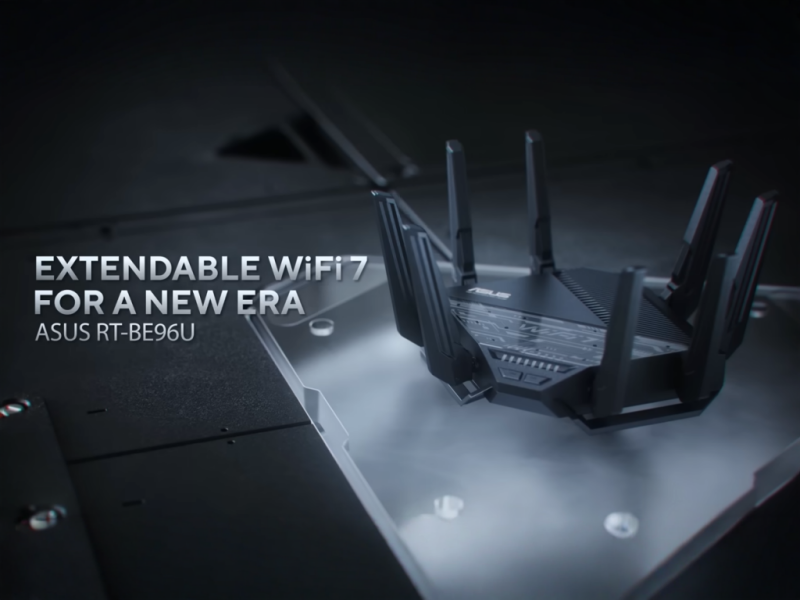
The RT-BE96U Router is a high-performance Wi-Fi 7 tri-band router, delivering speeds up to 19000 Mbps with 6 GHz support, 320 MHz bandwidth, and 4096-QAM. It features dual 10G ports for ultra-fast wired connections, Multi-Link Operation for stable internet, and lifetime AiProtection Pro security. Designed for demanding applications like gaming and AR/VR, it optimizes throughput in dense network environments, while AiMesh support allows for extended coverage.
Best Mesh Routers
Amazon eero 6+ Mesh System Router

The eero 6+ Mesh System Router provides gigabit speeds, up to 1.5 Gbps, covers up to 3,000 square feet, and connects over 75 devices. Affordable and backward-compatible, it enhances Wi-Fi 6 with extra bandwidth to support simultaneous streaming and working. Reliable connectivity reduces dropped calls, while TrueMesh technology minimizes dead spots. The system sets up easily via the Eero app, offers excellent customer support, and includes automatic security updates. It is compatible with Amazon Alexa, allowing voice control for network management.
Best Gaming Routers
MSI Radix AXE6600 Gaming Router
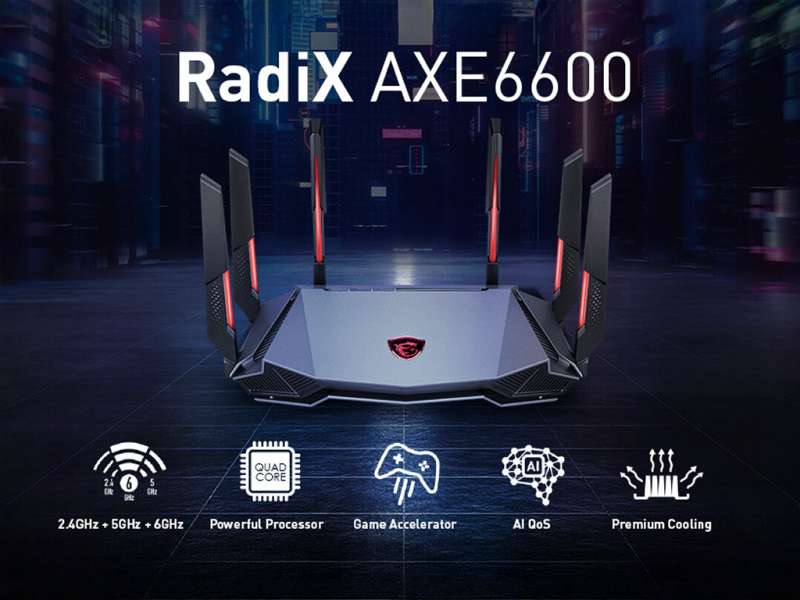
The RadiX AXE6600 Router is a Wi-Fi 6E tri-band gaming router offering up to 6.6 Gbps speeds across 8 streams, leveraging the 6 GHz band for reduced congestion. It features A.I. QoS (Quality of Service) for automatic traffic prioritization, a 1.8 GHz quad-core processor for reliable connections, and a game accelerator for optimized gaming. With customizable RGB lighting, a 2.5 Gigabit port, and strong performance, it’s designed for high-speed, low-latency gaming and overall network efficiency.
Best Smart Hub Routers
Google Nest Wi-Fi Pro Router

The Nest Wi-Fi Pro Router is a Wi-Fi 6E central hub designed for reliable, high-speed smart home connectivity. It automatically optimizes network performance, prioritizing video calls and website loading, and self-monitors for issue resolution. Delivering speeds up to twice as fast as Wi-Fi 6E, it offers tri-band coverage across 6,600 sq ft with a 3-pack, and includes security features like secure booting and automatic updates. The system also allows for network management through the Google Home app, including device monitoring and guest network creation, all within an eco-friendly design.
Best Enterprise-Grade Routers
Cisco 4321 Integrated Services Router

The 4000 Series Integrated Services Routers (ISR) enhance WAN communications for enterprise branches with intelligent networking and application-aware features, ideal for areas with limited IT resources. These routers connect to private and public clouds via MPLS and VPNs, integrating Cisco SD-WAN and high throughput. They run services like encryption without reducing speeds, enable easy activation of new features through licensing, and support speeds up to 10 Gbps. Features include remote service installation, robust security like dynamic VPNs, and cost-effective VoIP with integrated IP PBX functionality.
Best Budget Routers
Reyee RG-E6 Ethernet Router
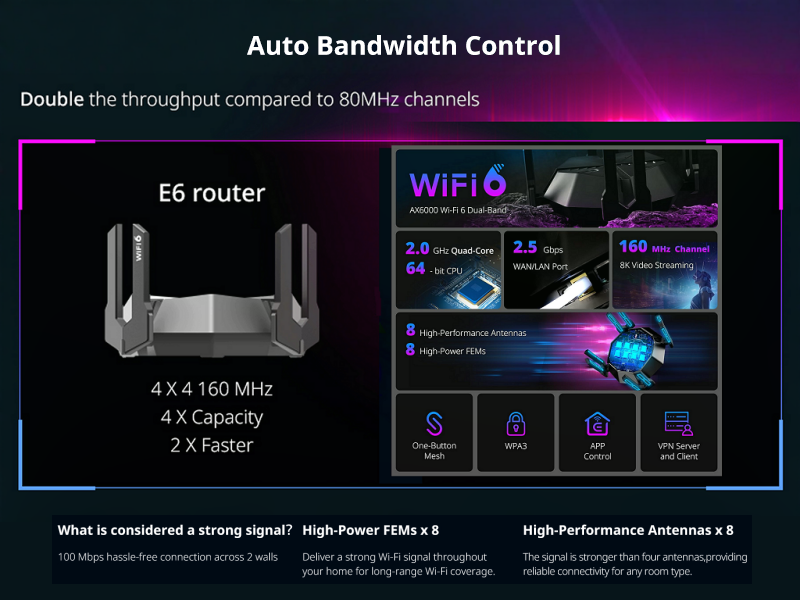
The E6 Ethernet Router delivers speeds up to 5,952 Mbps with a 2.0 GHz quad-core CPU, perfect for lag-free gaming in small to medium homes. Its dedicated gaming port and QoS (Quality of Service) prioritize wired and wireless gaming traffic, while eight antennas ensure strong coverage. With a 2.5 Gbps port for multi-gig internet or devices like NAS, it supports 10+ players with minimal lag. This router is a budget-friendly option due to its lower price compared to similar routers, offering a good balance of features like Wi-Fi 6 and a 2.5 Gbps WAN port, despite lacking some high-end extras.
Best Travel Routers
GL.iNet GL-AXT1800 Travel Router
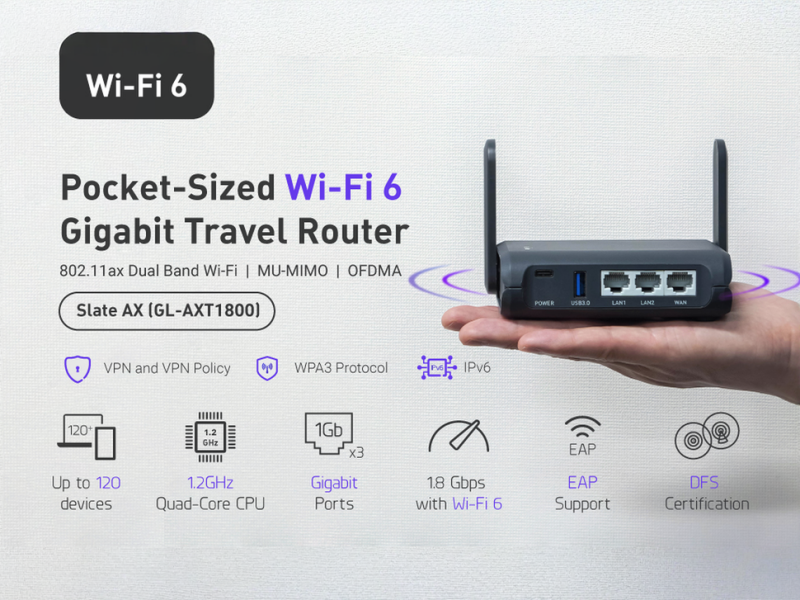
The GL-AXT1800 Router is a portable Wi-Fi 6 router offering speeds up to 1800 Mbps and support for up to 120 devices. It features MU-MIMO, OFDMA, and BSS (Basic Service Set) color for enhanced performance, as well as OpenVPN and Cloudflare for secure browsing. The router also includes a USB port and TF card slot for file sharing and storage, and runs on OpenWrt system for embedded customization. Additionally, it can act as a repeater for public or hotel Wi-Fi, and has a toggle switch for easy enable/disable of VPN or AdGuard Home.
What Future Breakthroughs can we expect in the Hi-Tech Routers Industry?
The high-tech routers industry is poised for exciting breakthroughs as technology continues to advance. Several trends and innovations currently in development suggest what might be on the horizon:
- Wi-Fi 7 and Beyond: Wi-Fi 7, set to be standard soon, delivers speeds up to 46 Gbps, lower latency, and better performance in crowded networks with features like 320 MHz channels and MLO (Multi-Link Operation). Wi-Fi 8, expected by the near future, aims for greater efficiency and interference reduction.
- AI-Driven Network: Routers will increasingly leverage A.I. to optimize traffic, anticipate congestion, and automatically fix issues like dropped connections. For example, A.I. may prioritize bandwidth for more virtual communication calls or gaming while efficiently managing IoT devices, creating a “self-healing” network. This will be especially beneficial for mesh systems, where A.I. can dynamically adjust node connections for seamless coverage.
- Satellite Internet Integration: Future routers will seamlessly integrate with networks like Starlink, Amazon Kuiper, and OneWeb, featuring automatic switching between satellite, fiber, and 5G/6G for optimal connectivity. This will be especially beneficial for remote areas, nomadic workers, and critical applications needing reliable failover options.
- Increased Security: Routers will evolve to include advanced encryption (beyond WPA3), Device-level quarantine zones for compromised gadgets, A.I.-backed anomaly detection, and security protocols to safeguard sensitive data and adopt zero trust models, ensuring every device and user accessing the network is thoroughly verified.
- Enhanced Power Efficiency: Future routers will focus on power efficiency, potentially utilizing energy harvesters to reduce energy consumption as well as support for sleep modes to minimize power usage when not in use, aligning with global sustainability goals.
- Customization and Personalization: Customizable routers with personalized settings allow users to modify configurations to prioritize devices, allocate bandwidth, and optimize network performance, making them ideal for specific needs like gaming, streaming, or remote work.

Related Posts
The 2026 Online Income Tutorial: Low-Effort, High-Return Strategies
The top 2026 online income tutorial combines AI, niche skills, and automation for low-effort,…
How Amazon Makes Online Shopping Fast and Enjoyable
Amazon makes online shopping fast, fun, and convenient for tech gadgets, home appliances, and kids’…
5 Must-Have Wellness Tech Kits for 2026
2026 marks the shift from generic wellness tech to truly personalized care. Smarter wearables and…
AI vs. Nature’s Fury: Revolutionizing Natural Disaster Management
AI is revolutionizing how we handle natural disasters—enhancing early warnings, streamlining…
The Must-Have Security Gadget of 2025: Hidden Camera Detectors
Hidden camera detectors are the must-have security gadgets of 2025, helping safeguard privacy and…
Top 10 Best-Selling Portable EV Chargers
As electric vehicles (EVs) grow in popularity, a reliable portable charger is essential. Here are…
Which Top 10 Smart Home Products on Amazon Will Upgrade Your Life?
Discover the top 10 smart home products on Amazon that can simplify and upgrade your daily…
Top 10 Things to Consider Before Investing in a Hi-Tech 3D Printer
Keep these top 10 essentials in mind before purchasing a hi-tech 3D printer to make the most of…
The High-Tech Revolution: A Before-and-After Perspective
Technology's Before-and-After impact extends beyond tools, transforming environments and societies…
The Ultimate Hi-Tech Wish List: Gift Ideas for the Gadget Enthusiasts
Whether it’s for a birthday, holiday, or just to show you care, this hi-tech wish list will help…










